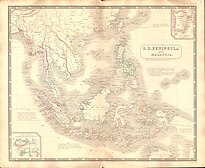| Assassination of Sir Henry Gurney | |||||||
|---|---|---|---|---|---|---|---|
| Part of Malayan Emergency | |||||||
| |||||||
| Belligerents | |||||||
|
|
| ||||||
| Commanders and leaders | |||||||
|
|
| ||||||
| Strength | |||||||
| 13 policemen | 38 insurgents | ||||||
| Casualties and losses | |||||||
|
2 killed 5 wounded | none | ||||||
| Malayan Emergency | |
|---|---|
| Background | |
| Battles | 1948
1950 1951 1954 1956 |
| Foreign involvement |
|
The assassination of Sir Henry Gurney took place on 6 October 1951 at the height of the Malayan Emergency. Gurney, the British High Commissioner in Malaya, was killed by members of the Malayan Communist Party at Mile 56 ½ of Kuala Kubu Road on his way to Fraser's Hill for a meeting.
Gurney was riding in his Rolls-Royce Silver Wraith with his wife, private secretary D. J. Staples, and his Malayan chauffeur as part of a convoy that included an armoured scout car, a police wireless van, and a Land-Rover with six Malayan policemen sitting in its open back. Eight miles from the ambush site, the wireless van developed engine trouble, and the commander advised Gurney to wait, but Gurney decided to press ahead with the rest of the convoy.
About 60 miles (97 km) north of Kuala Lumpur, as the convoy rounded a curve in the road, it was ambushed by a force of 38 Malayan Communist Party guerrillas, who opened fire on the convoy with three Bren guns, Sten guns, and rifles. Gurney and five of the six Malayan policemen in the Land-Rover were wounded, and his chauffeur was killed. Both vehicles came to a halt as bullets punctured their tyres. Gurney pushed his wife and private secretary into the footwell of the car, then got out and staggered forward towards the ambush site to draw the insurgents' fire away from the car and towards himself. The guerrillas fired in his direction, fatally hitting him.
The armoured scout car pushed ahead of the Rolls-Royce with some difficulty to get help from a nearby police station. The insurgents stayed in the area for about ten more minutes, firing intermittently at anything that moved. A bugle call then sounded, and the insurgents pulled back.
When the firing eased, Lady Gurney crawled out of the Rolls-Royce, only to discover her husband's body lying in a roadside ditch. Twenty minutes later, the officer in charge of the armoured scout car arrived at the scene with reinforcements from the police station.
According to Communist leader Chin Peng, the ambush was routine, the killing by chance, and the guerrillas only learned the High Commissioner was among the dead from news reports.
References
- Text of telegram from Sir M.V.del Tufo,Chief Secretary,Federation of Malaya Govt. to Mr.Griffiths,Secretary of State for the Colonies. accessed 4 November 2013
- "Guerrillas Murder High Commissioner In Malaya". The Canberra Times (ACT : 1926 - 1995). ACT: National Library of Australia. 8 October 1951. p. 1. Retrieved 4 November 2013.
- Grob-Fitzgibbon, Benjamin: Imperial Endgame: Britain's Dirty Wars and the End of Empire.
- Telegram from Chief Secretary del Tufo of the Malayan Government to Colonial Secretary Griffiths
- Chin Peng, My Side of History, Media Masters, Singapore, 2003, pp. 287-289.
External links
- Photo of the spot where Sir Henry Gurney was ambushed, from a personal account of flying Bristol Brigand aircraft with 84 Squadron RAF during the Malayan Emergency - Terry Stringer
| Communism in Malaysia and Singapore | |||||||
|---|---|---|---|---|---|---|---|
Wars and incidents   |
| ||||||
| Organisations | |||||||
| Key people |
| ||||||
| Related topics |
| ||||||
| Peace agreements |
| ||||||
| In popular culture |
| ||||||
